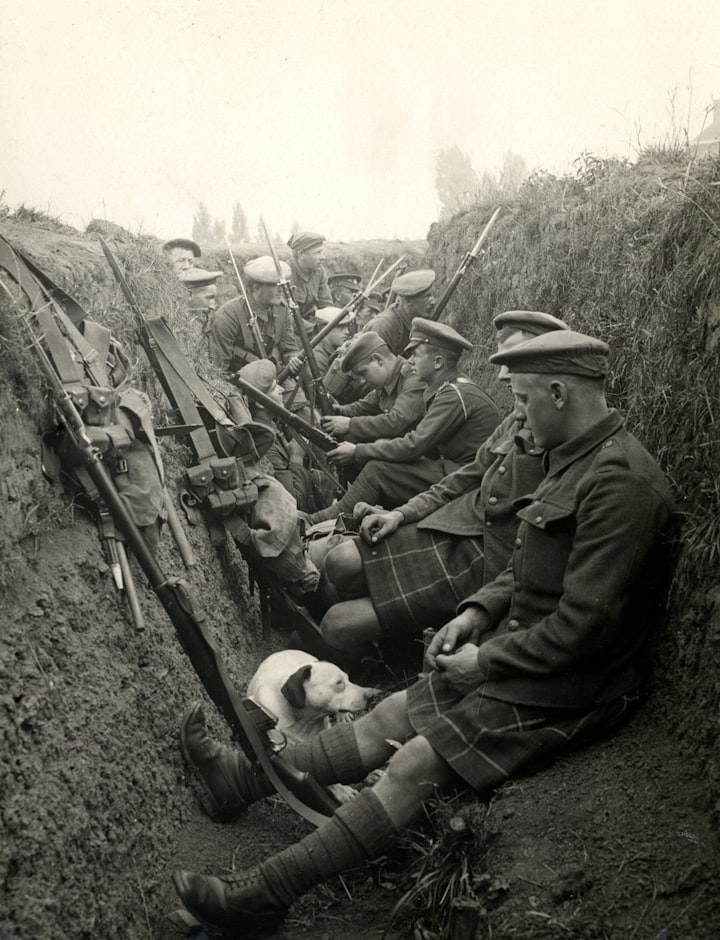No Man's Land
Submission for Ship of Dreams Challenge

The Western Front, Somme, France
April 14, 1916
Those who never experienced war did not understand it, and those who did understood it even less. William Starling had a grasp of unspeakable things unique to very few living people, which spared him the sunken, doll-like look of a man of war. He saw the look on the faces of the men with whom he shared the trench, a great wound in the earth. Men who, if passed on the street in his native Liverpool, Blackpool, or even under the sheen of Manchester, would be bright with easy, unearned confidence. The age of the men in William’s battalion, hardly old enough to shave—and he not much more—had no bearing on their condition. Men triple their age back home had no context of Hell that could assuage their constant dread.
William slept better than most, even though the sea tried to claim him once more. She failed once, but had found him again. The water in the trench was knee deep, and while others blamed the relentless rains, William knew it had followed him from the sea. He fell asleep before all the others because he had already seen Hell, and knew how entwined it was with Heaven. William dreamed of it every night. He dreamed of the Titanic.
Sunday. The Fourth day. The final day. William stood barefoot next to his bunk on E deck, where the crew was hidden away, so he could feel the thrum of the great engines as they traveled through the spine of the Titanic. The awe was still in William’s blood four days into the maiden voyage, having never been aboard anything larger than a seventy-five-foot windjammer whose rigging he fumbled with as a deckhand during the endless summer after graduation. His father, embarrassed by William’s denial of the seawater in his veins, laid the advertisement for employment with the White Star Line on his table, with the promise of three pounds fifteen shillings a month wage and the opportunity to make something of himself at sea, one way or another. Once posted to the RMS Titanic, his father displayed the closest thing William had seen to pride, knowing his son would be aboard the magnificent, unsinkable champion that would steam its way into the brave new world.
Being on board the floating palace as a steward, William’s brush with the majesty of the Titanic was brief, and at times he forgot he was even on the ocean. His main route through the ship was Scotland Road, the crew alleyway that ran the length of Her, and allowed crew—and steerage passengers looking for some air—to move about the ship below the upper decks. Several First-Class passengers he served referred to the Titanic simply as “The Steamer.” William soon found a way for the anonymity of service to benefit him. He could go anywhere without even a cursory glance if he walked with purpose, presumably on some important errand. After dinner service, he snuck out onto the vast promenade on A deck to breathe in the sea air and think of his father.
“11:30, lights out.” That was, of course, with the exception of the First Class Smoke Room, a place made for exceptions. Nestled off the Aft Grand Staircase, a sign reading, Gentlemen Only guarded the entrance. Inside, men of refinement and prestige were free from bored wives on their arms to discuss business, politics, and other topics not for everyone’s participation. Most importantly, they were there to smoke and drink. No games of chance that night. It was Sunday, after all. The card sharks were conspicuously absent. William tended to the men’s needs, ushering fine brandy and Cuban cigars throughout the room panelled with dark mahogany inlaid with mother-of-pearl. Two lion statuettes guarded the Italian marble fireplace. The men wore black-tie dress and puffed their chests. William thought of them as The Penguins. They huddled on sofas and lounged in wingback chairs, or held court on their feet with tales of corporate conquest. For the gentlemen of the First Class Smoke Room, life was as it was and ever would be.
Bang.
She seemed to William to shiver, like his serving cart did when he scraped it against the bulkhead on Scotland Road while daydreaming of his feet on land. It elicited nothing but the briefest pause in conversations. A second shiver, this one more prominent, just a few seconds later, brought even the most puffed Penguin to silence. Questioning murmurs rippled through the room and the smoke swallowed them up.
“Nothing of consequence,” a Penguin said. To those in the First Class Smoke Room, very little was. On the lower decks, they felt the consequence.
The ship took on water.
The Penguins went about their business, and William drifted between them, lighting cigars and filling snifters. The hum of the ship’s engines, merely a rumour on the First-class Deck, ceased. Fear, rising in his blood since the first shiver, congealed in William’s stomach. He managed a ghost of a smile in response to quips about getting in their last drinks before the toll of midnight. Another Penguin William recognized as a bridge player from an earlier night entered.
“Bit of a circus out there.” He said. “Word is we hit something.”
“Hit what?” A rotund Penguin with a waxed moustache said.
“Ice, by the look of it. Chunks of it are scattered on deck.”
“Well, have them bring some down. My drink is getting warm,” the Rotund Penguin said, drawing a symphony of laughter.
The haze of cigar smoke was heavier when another steward entered the Smoke Room, hugging a pile of lifebelts.
“Gentlemen,” the steward said. “If you please, join us on the boat deck, wearing these.”
“What’s the meaning of this?” A tall, pencil-thin Penguin said.
“Precautionary measure, I assure you. You may have gotten word, we were dealt a glancing blow.” The steward shot a glance to William, and it told him everything he needed to know. The fear in his stomach grew wings.
On deck, William and the waddle of Penguins discovered the lifeboats were being lowered to deck level by the crew, and a growing number of passengers, bound with lifebelts, were huddling near. The steward who had brought the lifebelts to the Smoke Room took William by the arm and guided him away from the passengers.
“She’s taking on water. The boiler rooms are full up. I’m getting word to Scotland Road.” Then he was gone.
Unsinkable, that’s what they said. William slipped past the passengers to the forecastle. The sea was consuming Her, the stern going under. The water was swimming pool green in the lights. The winged fear inside of William dug its claws into him. Rejoining the lifeboats, the crowd had doubled in size. A crewman waved to William.
“Oy, gather the women and children!”
So he did, part of his brain locked away from the fear thing that beat its wings frantically inside him, judging a calm but decisive speed to organize the passengers. A short, stocky woman appeared at the head of the cue, baggage in tow, wearing furs and evening shoes.
“Madam,” the crewmen said, “baggage must remain.”
“I think not,” the woman said, handing him a suitcase as if he was a porter. “Will we be aboard for breakfast?”
“Madam,” the crewman said, throwing the suitcase aside, “baggage remains. Step lively.”
Her mouth fell open in indignation for what could have been the first time in her life. When the crewman took her by the arm, the violence of the sinking ship was suddenly in her, and it didn’t have far to travel, coming out as a sharp battering of the crewman with her handbag, a constellation of pearls flying loose and scattering on the deck.
William helped a woman clutching a tiny baby onboard the lifeboat. Amidst the chaos, the baby was calm as a summer’s nap, eyes bluer than the sea. Once settled, the woman reached out for her older son to be next. He was tall, with a shock of red hair. The crewman held out his hand.
“How old are you, son?”
“Sixteen,” the boy said.
“Children only.”
“Sorry,” the boy, now a man, said.
William would never forget that response. He didn’t know who the manboy was apologizing to. The crewman, for assuming he was worthy of the boat? His mother, for growing into a man, unbeknownst to her? To himself, for the betrayal of age? The mother wailed and cursed the crewman, but in the jostling for a spot, the manboy was gone. It was the last William saw of him, but it was not the last of him (Being judged old enough to die, the mark was on him, so even though he reached safety on another lifeboat, he found himself in the war. As William dreamed once more of the Titanic, that manboy, now much more so a man, clipped barbed wire in No Man’s Land under the cover of darkness, twelve miles from where William slept). The Titanic shuddered with an elephantine groan. She pitched at an angle no denial could further cling to. Panic rose in a swell and washed over the ship.
There’s room in that one you bastard Let her go steady forward lower away astern My wife someone people help my wife Do you know who I am You there off the davit it won’t hold Has anyone seen my dog She’s listing hard look Was it the engine I think it was the engine Women and children women and children Get back or I’ll shoot I swear it Please help me my mother cannot stand My God we’re going down Everyone in an orderly fashion Our Father who art in Heaven hallowed be thy name I am not leaving him Where are the lifebelts I am not leaving him Head to Portside they are taking men there Please I want to be with my sister Cut that line she’s tangling cut it Gentlemen stand aside There are not enough boats why are there not more boats?
The rending of steel, buckling of wood, tickling of violins. Fingernails on portholes. Screams on the deck. Screams in the ocean. Screams in the boats. The boats. Paddling hard to get free. Tableaus in the night under the flashes of rescue flares. William scrambled as She rose from the water. His heels scarred the deck. Reaching. Clinging. Thuds of flesh on metal. She moaned. A wounded animal. Down. A hand on his leg. Vice grip. Gone. She went dark. Gargantuan snap. The world broken in two. Her stern heaved. A severed colossus. Deep breath. Deep breath. Brace. The cold. Dark. Down She went. Down. The sea. Black glass. He jumped. No breath. Ice in his marrow. Ice. Down. Down.
Dawn. William took a moment to feel the dirt between his fingers and under his heels. There were no hands to pluck him up from death and warm him up this time. He rose on his own. The men slumped over their rifles or absently shoved rations into their dirty mouths. William waded defiantly through the water, knowing today it would not have him, though he knew he could not say the same for tomorrow. He carried with him, even in war, something that resembled gratitude for the sun on his face once more. They went over the top that day, and while William waited for his turn at the ladder, he thought of the mother with the baby and the dispensable son, the Penguins, the crewmen, his father, and the people back home in their beds. He fought for them. If it was to be his day, William thought, he would die in the dirt.
About the Creator
Ryan Smith
I'm a good dad, a decent writer, and a terrible singer.
Reader insights
Outstanding
Excellent work. Looking forward to reading more!
Top insights
Excellent storytelling
Original narrative & well developed characters
Expert insights and opinions
Arguments were carefully researched and presented
Compelling and original writing
Creative use of language & vocab
Heartfelt and relatable
The story invoked strong personal emotions
Masterful proofreading
Zero grammar & spelling mistakes
On-point and relevant
Writing reflected the title & theme
Easy to read and follow
Well-structured & engaging content
Eye opening
Niche topic & fresh perspectives







Comments (10)
Terrific story, what a great take on the challenge.
This is wonderful - well deserved win.
you should have won, o well, you won to me. this story was so great, it's like you were there (you weren't, were you?)
I enjoyed your story. The parallel between the Titanic and WWI was interesting. And the jumbled, run-on paragraph was an effective way to convey the chaos and panic.
Really fantastic!
Great job! Loved your style of writing and wanted to keep reading more - congratulations on your 2nd place win! 🥳
The run-on paragraph did an amazing job of letting the reader picture the chaos that was going on during the sinking of the Titanic. Great job!
You'll be a great author, screenwriter, and filmmaker. I see you writing action movies similar to the movie 300 creating visualizations to them. You're amazing.
I can't believe your story didn't win the contest. I swear that the judges are choosing their friends to win - First Place was klunky writing. I'm leaving Vocal Media this month, going to take a chance somewhere else. I thought it was just me, but I looked at what others said online about how the people who judge these stories don't seem like they know what is good, and I felt vindicated. Good luck to you, you have a voice.
I agree. The blend of fiction with the history was very clever! Taking the story outside of the Titanic and onto the battlefield was inventive and beautifully wrought.